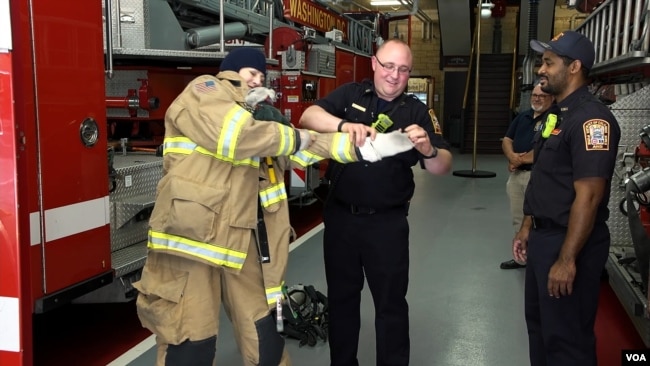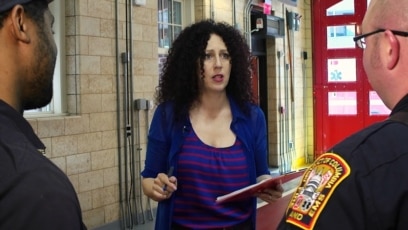Tóm lược (Summary)
Anna becomes a fire safety monitor. But will she do a good job? And when will she use her skills?
Anna trở thành một giám sát viên an toàn cháy nổ. Nhưng liệu cô có làm tốt công việc này không? Và khi nào cô sẽ sử dụng được kỹ năng của mình?
Hội thoại (Conversation)
PENELOPE: Hey, Anna. What are you reading?
ANNA: I’m reading about fire safety. Ms. Weaver named me fire safety monitor.
PENELOPE: But the only time we have a fire emergency is when someone burns a piece of toast.
ANNA: That is true. But fire safety is very serious – very serious. If there is a fire emergency, I have to help everyone out of the building.
PENELOPE: Well then, if I were you, I’d learn as much as possible.
ANNA: You’re right. And I know just who to call!
PROF. BOT: Hmm, I wonder where Anna’s going. Today we are reviewing conditionals and learning helpful language for emergencies.
PROF. BOT: If Anna studies hard, she’ll be a great fire safety monitor! That’s a conditional. It uses “if” to show that something is true only when something else is true.
PROF. BOT: Let’s find out where Anna is going. And if you want to learn fire emergency language, keep watching!
(Two firefighters welcome Anna to their firehouse.)
ANNA: Hi, Firefighter Jones.
FIREFIGHTER JONES: Hey, how are you, Anna?
ANNA: I’m well, thanks. How are you? Hi, Firefighter Hatcher.
FIREFIGHTER HATCHER: Hi, Anna. How are you?
ANNA: I’m well, thanks.
FF H: Welcome to our firehouse.
ANNA: Thank you.
FF H: Come on in.
ANNA: Thanks.
FF H: This is where the firefighters eat. This is where we rest. This is where we exercise. This is where the firetrucks are parked and maintained.
ANNA: This place is beautiful.
FF H: You know, the firehouse is a firefighter’s second home.
ANNA: Firefighter Jones, Firefighter Hatcher: Can you tell me some ways to prepare for a fire emergency?
FF H: Sure, Anna. There’s one really important thing you can do: Install a fire alarm. Test it monthly and make sure the batteries are fully charged.
ANNA: Let’s talk about those emergency exits.
FF J: In your home, office and schools, know where your emergency exits are located.
ANNA: What about fire extinguishers?
FF J: Everyone should know how to use a fire extinguisher. Have one handy and practice using it.
ANNA: What if we need to get out?
FF J: You should have an evacuation plan. And practice getting out safely with fire drills.
ANNA: If I am in a building and it’s on fire, should I use the elevator?
FF H: No. Always use the stairs.
ANNA: What other safety tips should I know?
FF J: Stay low. Smoke rises. The air is clearer close to the ground.
ANNA: Stay low. Anything else?
FF H: If you touch a door and it’s hot, don’t open it. There might be a fire on the other side.
ANNA: What do I do if my clothes catch on fire?
FF H: Do not run. If you run, the fire will burn faster. You must stop, drop and roll.
ANNA: Thanks so much! I’ve learned a lot. And I can’t wait to share this information with others.
FF H: Thanks for coming, Anna.
FF J: It’s been a pleasure meeting you.
(Anna is back at the office talking to Penelope.)
PENELOPE: So, Anna, how was the visit to the fire station?
ANNA: I learned a lot! And firefighters have a very difficult job.
PENELOPE: Do you smell smoke?
ANNA: No. So, like I was saying, I learned how to …
PENELOPE: Anna, I smell smoke.
ANNA: If you smell smoke, call the fire department!
(Anna begins to evacuate her coworkers.)
ANNA: If you smell smoke, get out of the building. Come on people, we have a fire emergency! Leave your things and evacuate calmly and quickly. Very good. Very good.
ANNA: We have a fire emergency. No, take the stairs Let’s get out. Let’s get out safely.
(Anna and coworkers stand outside of the building.)
ANNA: We got out in less than 6 minutes! Good job, people! Wait. Where’s Pete?
PENELOPE: I know where he is. I’ll go get him.
ANNA: No! Never go back into a burning building! The fire department is
coming. Stay calm, Pete. Help is on the way! Help is on the way!
Từ ngữ mới (New Words)
alarm – n. a device that makes a loud sound as a warning or signal
catch on fire – v. to begin to burn
clearer – adj. not blocked by anything (comparative form of clear)
close – adj. near in space
door – n. a movable piece of wood, glass, or
metal that swings or slides open and shut so that people can enter or
leave a room, building or vehicle
emergency – n. an unexpected and usually dangerous situation that calls for immediate action
evacuation – n. the action of leaving or removing someone from a dangerous place
exit – n. something, such as a door, that is used as a way to leave a place
fire drill – n. an activity in which people practice leaving a place quickly so that they will know what to do if there is a fire
fire department – n. an organization for preventing and putting out fires
fire extinguisher – n. a metal container filled with chemicals that is used to put out a fire
fire department -- the department of a local authority in charge of preventing and fighting fires
firehouse – n. a building in which the members of a fire department and the equipment used to put out fires are located
fire station – n. another word for firehouse
handy – adj. near or close
install – v. to make a machine or service ready to be used in a certain place
low – adv. at or to a low place or level
open – v. to move a door or window so that an opening is no longer covered
maintain – v. to keep something in good condition by making repairs or correcting problems
monitor – n. a person who has the job of checking or watching some activity or behavior
rise – v. to move upward
safety – n. freedom from harm or danger
smoke – n. the cloud of black, gray, or white gases and dust that is produced by burning something
stay – v. to continue to be in a specified state, condition, or position
touch – v. to put your hand, fingers, et cetera on something or someone
Câu điều kiện (Conditionals)
Let’s review! You’ll remember conditionals from Lessons 12 and Lesson 13. Conditionals show that something is true only when something else is true.
TYPE 1 conditionals have a real event, and a result that probably will happen.
|
Sentence Form |
Examples |
|
If + present tense verb ... will-future verb. |
“If you run, the fire will burn faster.” |
|
If + present tense verb … modal + simple verb. |
“If you are in a building that is on fire, you must not use the elevator.” |
|
If + present tense verb … simple verb without subject (imperative) |
“If you smell smoke, call the fire department!” |
TYPE 2 conditionals have an improbable event and its probable result. These conditionals are not based on real situations.
|
Sentence Form |
Examples |
|
If + past tense verb ...would + simple verb. |
“If I were you, I’d want to learn as much as possible.” |
|
If + past tense verb…would + present continuous. |
If people didn’t burn toast, the fire alarm would not be ringing so often. |
Ngôn ngữ Khẩn cấp (Emergency Language)
Today, you learned important language to use for fire emergencies. Study and remember them. How many can you remember?
|
Helpful Language |
Helpful Phrases |
|
emergency exit/s |
Install fire alarms. |
Giờ đến lượt bạn (Now, You Try It)
Test yourself on what you learned!
- What do we call a person who fights fires?
- What's the name of the place where this person lives and works?
- What are some things you can do to prepare for a fire?
- What do we call practicing safely leaving a building?
- If you smell smoke, what should you do?
- If you see a fire, what are some things you might say?
- If your clothes catch on fire, what do you do?
Write your answers in the comments section below.
Bài kiểm tra Nghe (Listening Quiz)
See how well you understand this lesson by taking a listening quiz. Play each short video, then choose the best answer.







